- Home
- Jason Matthews
The Kremlin's Candidate Page 11
The Kremlin's Candidate Read online
Page 11
She hit the street, wanting to get away before Blokhin appeared, determined to clear her six so she could call Bratok. Never mind the FBI, now she had to worry about Gorelikov’s tricks, her own countrymen following her. Did Gorelikov’s vliyaniye, his influence, extend to the streets of New York? Who would they be, the people checking up on her? Well, she had survived this long spying for Nate and the others, and wasn’t about to be played. As she left the hotel and walked east, she put on the big fashion sunglasses that were designed by the boys in Line T, with beveled mirrors ground into the outer edges of each lens, which permitted a limited view behind her. You didn’t rely on such toys—detecting coverage on the street was much more complicated—but it did not hurt to have them.
Dominika walked for three hours, searching for and finding relatively quiet side streets, stripping away repeats, possibles, ghosts, and suspects. If her cell phone was beaconed and her route plotted later, she would be guilty only of executing a thorough and professional surveillance detection run. She used Union Square as a surveillance trap, knowing that any team scurries to cover exits along all sides of a park and inadvertently show themselves. She scanned the outer edges of the park. Nothing. She plowed up endless, bustling Fifth Avenue, the Empire State Building coming closer with each block—beckoning, bigger, taller, and somehow more substantial than the Vystoki, Stalin’s gothic Seven Sisters skyscrapers in Moscow. Nothing showed behind her. Occasional switches to the other side of the street revealed no telltale behavior of handing off the eye. She reversed her direction by taking a taxi south, past the Washington Square Arch, bailing out and walking through the urban campus of New York University to detect pedestrians who stood out among younger casual students. Nothing. Dominika popped into The Smile restaurant on Bond Street—she liked the look of the weathered boards on the ceiling and the rich brick walls—and asked to use the phone behind the bar, explaining in an exaggerated French accent to the skeptical barmaid in a dirty apron that she was from France, and that her mobile phone did not receive service in New York. Besides, I’m calling my CIA handler to discuss foiling a Kremlin attack on the political and security foundations of America, with the express goal of preserving your gravy-stained way of life.
She left her phone in her coat pocket, and hung the coat on a wall hook away from the bar. Bratok answered on the first ring. She told him about her cell phone and the old lady at the hotel, his low chuckle reassuring and comforting. He kept his comments short and cryptic, they’d reviewed meeting procedures a hundred times. “Five o’clock, go to the museum and wait outside. Got it? I’ll be looking out for you.” The line went dead. Gable had just told Dominika to rendezvous with him at the Monkey Bar, at three o’clock. The power-lunch restaurant was renowned for the iconic celebrity murals on its walls (hence “the museum”). Gable had also cryptically told her she’d be countersurveilled as she walked to the restaurant on East Fifty-Fourth Street. She wondered whether it would be the old team again, whether she’d see Nate’s slim features across the street, whether she’d hear his voice, and whether he’d sit beside her close enough to touch him, feel the heat of his body, smell him . . . Stop it.
* * *
* * *
Gable was chewing an unlit cigar and driving a wheezing, beat-up sedan with torn plastic seats and an Orthodox cross hanging by a plastic chain from the rearview mirror.
The officers from Benford’s CID countersurveilling Dominika gave Gable the all clear, and he had pulled up, thrown open the passenger door, and scooped her off the sidewalk in front of the Monkey Bar. Once rolling, he put fingers to his lips, nodding at the cell phone in her hand. He made two violent right turns, narrowly missed a pedestrian, and careered through crosstown traffic at high speed, shooting the gaps between taxis, trucks, and buses. After one near collision, Dominika reached up, grabbed the swinging cross, and theatrically kissed it. Gable winked at her, delighted. He ran a red light and cut left across oncoming traffic to turn onto Ninth Avenue in the direction of Dominika’s hotel. In classic alteration of surveillance detection run (SDR) pace, Gable now drove south slowly in the right lane, letting honking, gesticulating New York drivers pass him. They were black, no tails. After ten blocks, he swerved to the curb in front of a dingy storefront restaurant with “Turkish Cuisine” written in a faux mosaic over the door. He gestured for Dominika to leave her phone under the seat, and follow him into the restaurant.
The place was dark and cozy, with copper trays and ceramic nazarlik, blue evil-eye talismans, mounted on the walls. Gable ordered a çoban salad, two kebabs, and kiymali ispanak, sautéed ground beef, spinach, and rice. “You’ll love it,” said Bratok. “Nash and I used to eat it at a Turkish joint in Helsinki.”
“Helsinki,” said Dominika, staring. “Skol’ko let, skol’ko zim, so many summers, so many winters; it seems like a million years ago.” Gable looked at her while chewing a piece of bread.
“Yeah, we’ve all come a long way, you most of all,” said Gable. “Now tell me what’s going on.” Dominika sat back and talked fast. She told him about Gorelikov’s instructions and the meeting with SUSAN. She showed him the EKHO phones—they would not be hot-wired if they were meant for an illegal—thinking he’d want techs to take them apart to inspect, but Gable shook his head. “They could be trapped to reveal tampering, and you’re the only one who holds them.” Dominika described the meeting site on Staten Island.
“You know how to take the ferry?”
“I studied the entire route. I know how to get there,” said Dominika.
“This illegal, what’s she look like?” said Gable.
Dominika shrugged. “It was a little black-and-white photo,” said Dominika. “Blond, reading glasses, steely blue eyes. Short hair.”
Gable rubbed his face. “Christ,” he said. “A top illegal in the city and we can’t ID her. How many more of them out there, I wonder.”
“There is no way of knowing,” said Dominika. “Line S, the external illegals department, and Line N, the officers who handle them in-country, are compartmented from the rest of the Service, even from me in KR.” The food came to the table and Gable spooned a mound of glistening spinach onto Dominika’s plate. She tried a forkful. It was a savory combination of sautéed spinach and curried ground beef with a hint of rice. Delicious. And Nate used to eat it. The question popped out before she could stop herself.
“Bratok, where is Nate? What is he doing?” said Dominika.
Gable put down his fork. “Benford sent him to take care of another op. In Asia. Right now, that boy is busier than a cat covering crap on a marble floor. He’ll be back in a couple of weeks. You steamed at him again?” Gable just asked questions, no matter how sensitive.
Dominika smiled. “In Russia we say nalomat drov, to mangle the firewood. You say to mess something up. That’s our love affair. Messed up.”
Gable patted her hand. “I’m not supposed to say this to you,” said Gable, “but you should either cut it off with him once and for all, or defect and concentrate on your lives together. Maybe recruit your replacement before you go. Loving each other and spying at the same time is gonna get someone hurt.” Dominika was silent; she knew Gable understood her. “Don’t tell anyone I told you that,” he said, smiling. Then he got back to business.
“You gotta fly straight with that Spetsnaz guy hanging around. Let him see you nice and relaxed.” Dominika nodded. “Make the meeting with that gal on Staten Island alone, but otherwise keep him close. He’s going to file a trip report and you want them all to think you were never out of pocket. We’ll meet once more after your meet with the illegal. And try to get some ID on her without being too obvious.” Gable waved to a young man at a table across the room and Lucius Westfall walked over.
“This droopy bit of wet wool is Westfall,” said Gable. “He’s backup if you see him on the street, here to help you and me if we need it.” Dominika smiled and shook his hand, noting a blue halo quivering with nervousness. She felt sorry for him, especially since
she knew what a bear Gable could be.
“Glad to meet you, Westfall,” said Dominika. He nodded wordlessly, obviously overcome at meeting the famous DIVA. He’d had no idea she was so beautiful. He turned and left the restaurant after an awkward final bow.
“Bratok, you do not torment him too much, do you? He’s so young, like you were once.” Gable grunted.
“I was born old. But tell me more about the Spetsnaz sergeant.”
“This man Blokhin is worse than either Zyuganov or Matorin. He is intelligent, but behind his eyes are, how do you say, hot rocks like when you grill shashlik.”
“Like hot coals? Well, don’t arm wrestle him,” said Gable.
“I am forcing myself to go with him to an event at the Hilton on Sixth Avenue in two days. A Russian journalist, Daria Repina, is speaking at a Free Russia fund-raising event. She is a loud critic of everything Putin does. She is without fear, but now that she is in America raising money it will become dangerous for her.”
“Is it smart for you to be going to something like that? Why would a Spetsnaz snake eater want to go to hear some dissident?” said Gable.
“Attending with him will be a good appearance—I mean bona fides—for me,” said Dominika. “It is a public event. I will stay in the background and leave early. As for Blokhin, I think he is curious. Like a dog sniffing a lamppost. It will be his last night in New York. We both return separately to Moscow the next day.”
“And when you get back, you find out the name of MAGNIT, fast as you can, right?”
“Someone will make a slip. I will hear the name eventually,” said Dominika.
“That’s all well and good, but we gotta wrap MAGNIT up before then, preferably before you’re briefed on the case, before you’re officially told his name. How’s it gonna look if he gets arrested the very weekend you’re read in? Plus that prick is selling secrets wholesale. So let’s blow him up ASAP.”
“There is a problem.” Dominika told Gable about the malfunction with her SRAC transmitter after she had brained the street mugger. Gable shook his head.
“We wondered why you hadn’t sent anything for a week. I told them you had a boyfriend and wouldn’t get out of bed.”
“Nekulturny,” she said. Crude and rude.
“Dammit. Bad time to lose your commo,” said Gable. “I’ll cable the station to get you another set. You want them to cache it or do a personal meet?”
“If you have a good station officer who won’t bring surveillance with him, a personal meet is faster than me digging up a package in the forest. There are five new brief-encounter sites left in the inventory that are still good.”
“You sure? I’d rather break one nail using a shovel than have ten nails pulled out in a prison basement,” said Gable. One normally did not remind agents about being captured and tortured, but Gable and Dominika dealt with each other on a different plane.
“Bratok, that is because you are delicate and sensitive,” said Dominika.
“You fucking got that right,” said Gable, as he signaled for the bill.
KIYMALI ISPANAK—TURKISH SAUTÉED SPINACH
Sauté finely chopped onion in olive oil and butter. Add ground beef and cook until browned. Add diced tomatoes, red-pepper paste, tomato sauce, and a handful of rinsed rice. Season and stir to incorporate. Layer coarsely chopped spinach on top, cover and cook on medium heat until spinach is wilted and rice is tender. Serve with a dollop of yogurt and crusty country bread.
8
To Shoe a Flea
Dominika sat on the upper deck of the crowded, lumbering Staten Island Ferry, drolly appraising the collection of people lining the rail—they looked primarily like tourists—talking about, pointing at, and photographing the receding skyline of Manhattan. They would then rush to the starboard rail to snap the Statue of Liberty, then stampede back to gawk at a vintage gaff-rigged schooner tacking up the bay. They honked like a flock of geese. They were dressed in shorts, T-shirts, and brassiere tops, and wore boots, sneakers, shoes, and sandals, a bizarre tribe that rasped at Dominika’s Russian sensibilities. She was dressed in a light cotton summer-print dress, with fashionable flats, and carried a beige over-the-shoulder bag. She wore her Line T sunglasses. Despite the raucous passengers, she thought these ferries were a marvel, big orange birthday cakes that never stopped crisscrossing the bay, nothing like the belching, shark-nosed hydrofoils that skimmed across Lake Ladoga from Saint Petersburg.
She literally had been swept down the ferry boarding ramp by the crush of laughing, excited sightseers, past placid bomb-sniffing dogs, and was able to find a quiet seat along the outside rail where she enjoyed the salt breeze and thought about today’s meeting with the illegal, SUSAN. She had returned to her hotel room last night and felt the rubber band around her doorknob, a signal confirming a meeting at the site on Staten Island tomorrow afternoon. Dominika wondered if the old lady down the hall had snapped the band in place. She had reviewed the memorized drill, the surveillance detection route she would take: ferryboat, Staten Island train, walking route up to and through the sprawling Moravian Cemetery on Todt Hill, and final approach to the site (which was inside the ornate mausoleum of Gilded Age billionaire Cornelius Vanderbilt, constructed in 1886, and secluded in a private, wooded corner of the park). She had studied the satellite images and memorized the way along the lanes that wound through the forty-five hectares of the graveyard, and knew she could find her way to the site at the appointed time, without coverage. God knew who she had to worry about more on the street during this insane operation—Russians, the illegal, or the FBI.
Gable had been right: Moscow had moved fast. This call-out for the meeting with the illegal came less than forty-eight hours after Dominika had arrived in New York. Dominika could imagine the hurried consultation between Gorelikov and Putin in the Kremlin, their quiet voices briefly discussing options and then the stoic, blue-eyed nod validating whatever tactics Gorelikov suggested to enable the contact. Dominika immediately had gone back out and called Gable from a public phone at a nearby bar, to tell him that “lunch was on tomorrow.” Gable told her to stay cool, that everything she did or said would get back to the men who would be evaluating her. They agreed to meet after Dominika returned to Manhattan.
A swarthy young man leaning against the ferry rail in front of Dominika was obviously a local from Staten Island, dressed in a sports jersey, his dark hair slicked back. He noticed Dominika and came to sit beside her on the plastic molded seat. He flirted, charming and irreverent, his face close, pointing out landmarks as the ferry plowed across New York Harbor, including the arching Verrazano-Narrows Bridge—he called it the Guinea Gangplank although it was unclear to Dominika why—connecting the two boroughs of Brooklyn and Staten Island. Dominika could understand about half of what he said, but smiled and looked where he pointed. When she told him she was from France, he winked at her and knowingly said “Nice wines.”
The thrumming of the ferryboat engines moderated, then the deck shook as the engines were put full astern to ease the nose of the ferry into the exit ramp at St. George Terminal on Staten Island. Time to go, time to turn on, time to go to work. Dominika slung her bag over her shoulder, and nodded vaguely to the young man. Moving quickly, she followed the signs to the adjacent rail platform to board the southbound train. Quick checks to either side did not pick up the loitering passenger, or the too-long look from the young woman on the sidewalk, or the ticket clerk diving for the phone. No coverage, she thought, as she stepped into a train car. As the doors closed, Dominika saw with annoyance that the young man had boarded the next car, and was staring at her through the window of the connecting door. She didn’t have time for this: a Romeo following her, thinking he might get lucky with a hot tourist from France.
The train rattled and swayed and stopped frequently at suburban stations. A different world was unraveling in front of Dominika’s eyes on each side of the tracks. Commercial areas had petrol stations on every corner; there were supermarkets with tomatoes
stacked on display in front, and she counted restaurant after restaurant—most of them claiming they made the best pizza in New York. Was this even New York City? The train clanked past working-class neighborhoods of tidy two-story houses, shingled, with lean-to greenhouses and tiny fenced yards, some of which had curious aboveground swimming pools hardly big enough to hold a person. On every roof was a gray satellite TV dish, all pointed up in the same direction. The houses were nothing like the luxurious dachas of the siloviki; these were not rich people, but these houses looked comfortable. The cars parked along the street were big and relatively new. If this was not wealth, it was at least prosperity on a wide scale. In Russia, they would say blagopoluchiye, bread buttered on both sides, well-being. Not many people, not even in Moscow, were living lives with such possessions, with such abundant food. Her countrymen struggled to survive, they despaired of improving their lives, they dared not think grand thoughts or speak the truth. They could not choose.
Dominika had memorized the strange names of the train stations: Grasmere, Old Town, Dongan Hills, Jefferson Avenue, Grant City. People bustled on and off as the train doors opened and closed—no observable surveillance behavior, nothing amiss. She could see the young man in the next car watching her through the glass. The next station was her waypoint, New Dorp, where she had to get off. She stepped out to the platform and quickly walked in the middle of a crowd of passengers up the steep exit staircase to street level and onto a broad boulevard with light traffic. On the opposite corner stood an Italian bakery owned by someone named Dominick. Perhaps I will have a bakery someday named Dominika’s, she thought. Idiot you don’t know how to bake. She went inside, assaulted by the heavy aroma of fresh bread, noting there were no lines at the counter, was no one screaming for service, no churlish salesperson cursing at customers. She bought something called a calzone, which looked like an oversized chebureki, a Russian meat pie. This calzone was baked golden brown with a fluted edge, and was served with a small cup of tomato sauce.

 Shep Dreams of Home
Shep Dreams of Home Extreme Skiing and Psychedelic Mushrooms: The Art of Chasing Fear
Extreme Skiing and Psychedelic Mushrooms: The Art of Chasing Fear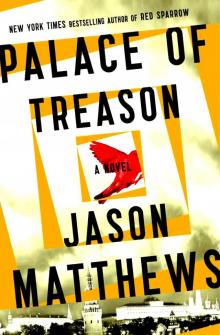 Red Sparrow 02 - Palace of Treason
Red Sparrow 02 - Palace of Treason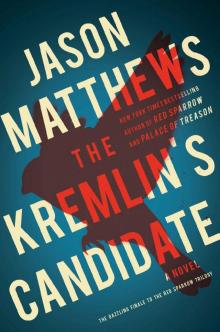 The Kremlin's Candidate
The Kremlin's Candidate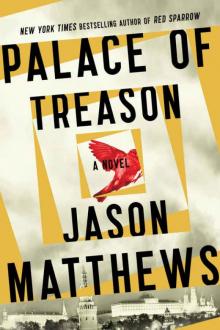 Palace of Treason
Palace of Treason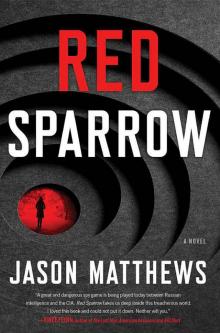 Red Sparrow
Red Sparrow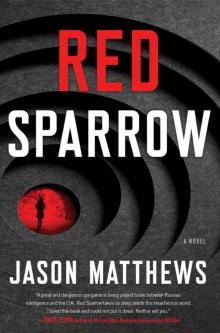 Red Sparrow: A Novel
Red Sparrow: A Novel